
When GPT-4 was released, it announced the results of a medical knowledge test developed by the American College of Physicians. In the end, it answered 75% of the questions correctly, which was a big leap compared to the 53% of GPT3.5.
In the past two days, a post about "GPT-4 saved my dog's life" has really become popular:
In just one or two days, thousands of people forwarded it, and tens of thousands of people forwarded it. People liked it, and netizens discussed it lively in the comment area.
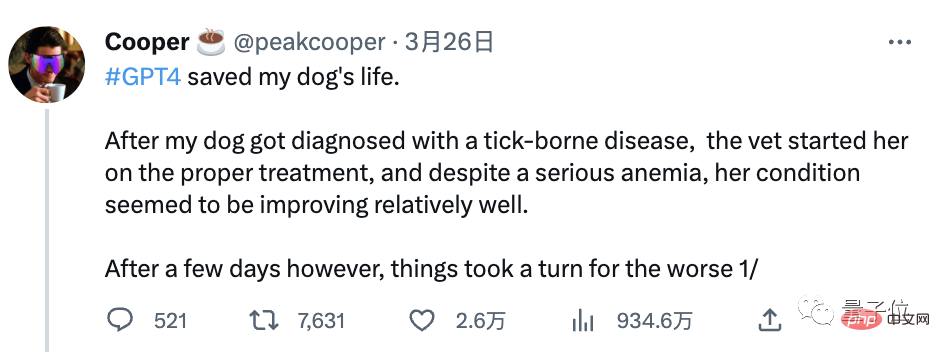
At first glance, everyone must be very surprised I wonder:
What is the relationship between these two? Can GPT-4 also have eyes to detect any dangers in dogs?
The real story is this:
The poster’s name was Cooper.
He said that a dog he raised was diagnosed with a tick-borne disease. Although it was accompanied by severe anemia, it improved relatively after a period of treatment.

But unexpectedly, within a few days, the condition took a turn for the worse:
dog His gums were pale and without any blood.
Cooper quickly took his dog back to the veterinarian. The blood test results this time were indeed worse than last time.
In order to rule out other concurrent infections related to tick-borne diseases, the doctor conducted many tests on the dog, but the results were all negative.
Seeing that the dog's condition was getting worse and worse, the doctor was still unable to give a diagnosis. He also told Cooper:
We should wait and see.
For most people who keep pets, pets are not just a simple life, but an existence that is better than a relative.
Cooper was no exception. He couldn't accept the doctor's suggestion at all and planned to go to a second hospital.
At the same time, he thought of GPT-4.
GPT-4 announced the results of a medical knowledge test developed by the American College of Physicians at the time of its release. In the end, it answered 75% of the questions correctly, which is a big improvement compared to the 53% of GPT3.5. leap.
Cooper thought that GPT-4 might be really good at diagnosing diseases.
So he did what he said. On the same day, he told GPT-4 one by one the symptoms of the dog from the first onset, the treatment process, and each blood test report:
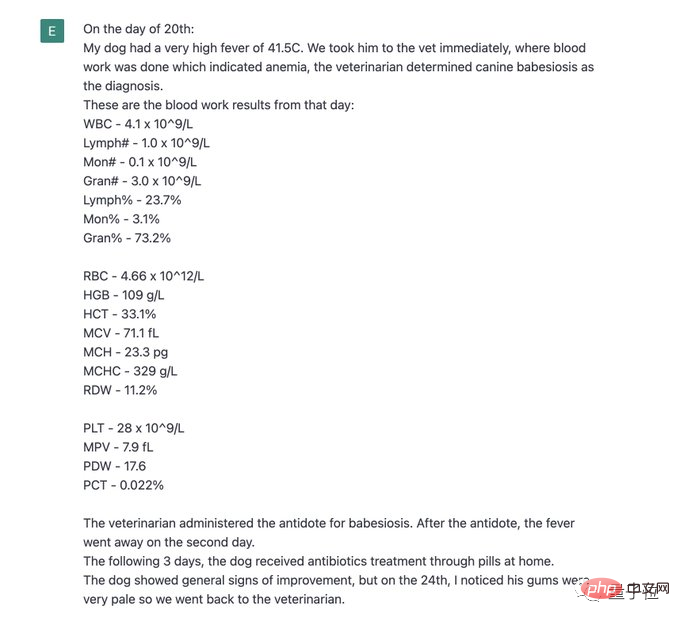
(To the effect: On the 20th, my dog had a high fever of 41.5 degrees Celsius. We immediately took him to the veterinarian. The blood test result was anemia, and the veterinarian diagnosed Canine Babesiosis. [Attached is the day’s blood test results] The veterinarian gave the dog an antidote for the disease, and the dog’s fever subsided the next day.
Over the next 3 days, the dog received antibiotic treatment (via Taking pills at home), the dog's condition showed signs of improvement, but on the 24th, I noticed that his gums were very pale so we went back to the vet.)
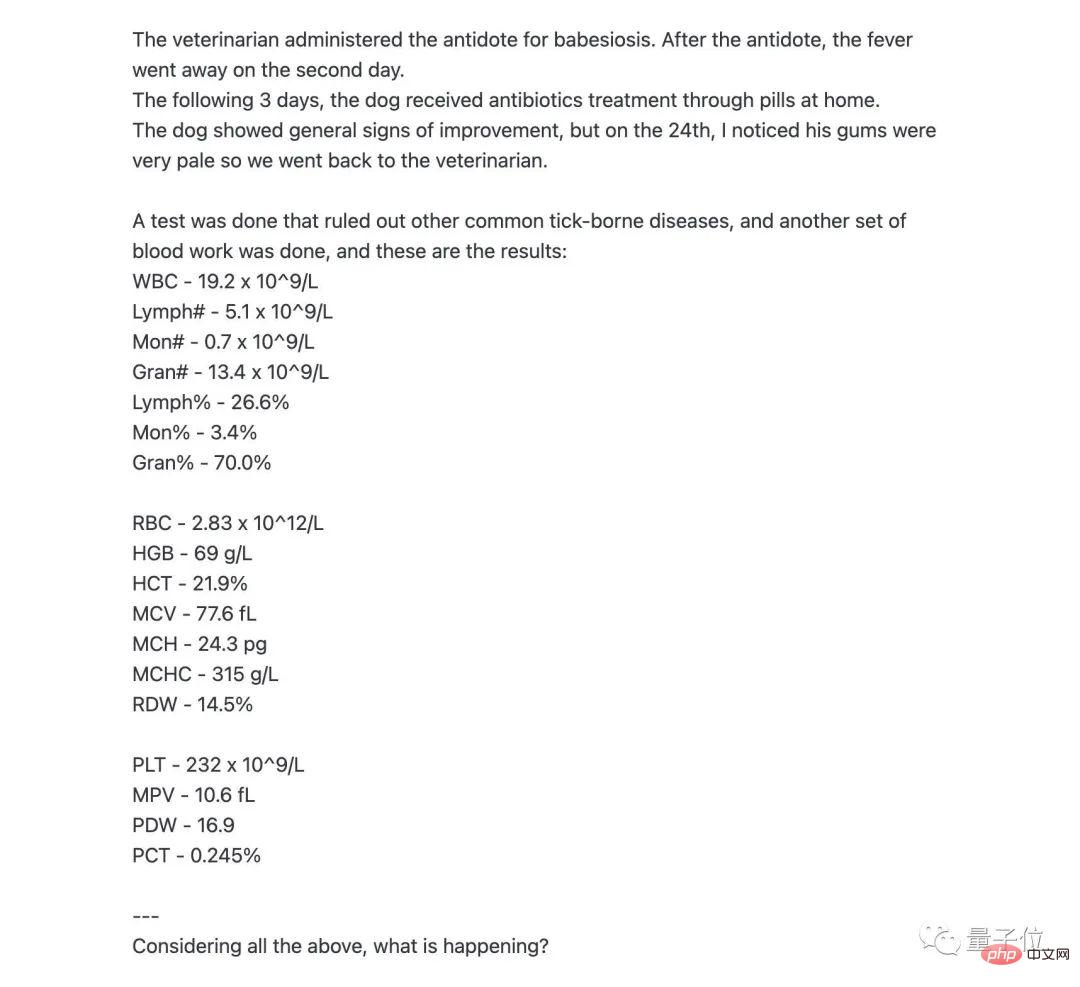
(To the effect: The doctor tested the dog again, ruled out other common tick-borne diseases, and did another set of blood tests: [results attached]).
Then, Cooper asked GPT-4:
Taking all of the above into consideration, what exactly happened?
Soon, GPT-4 began to answer.
It starts with the disclaimer "I'm not a veterinarian" and then says it "can try to help you analyze the blood report and tell you what may be going on with your dog."
It first analyzed the two most obvious abnormalities in the first blood report, and then said that the babesiosis diagnosed by the doctor was consistent with these phenomena.
Then he found three abnormalities in the second test result and told Cooper what each one represented. He told Cooper that these results indicated that the initial treatment was not completely effective, or that there might be other underlying problems causing it. anemia.
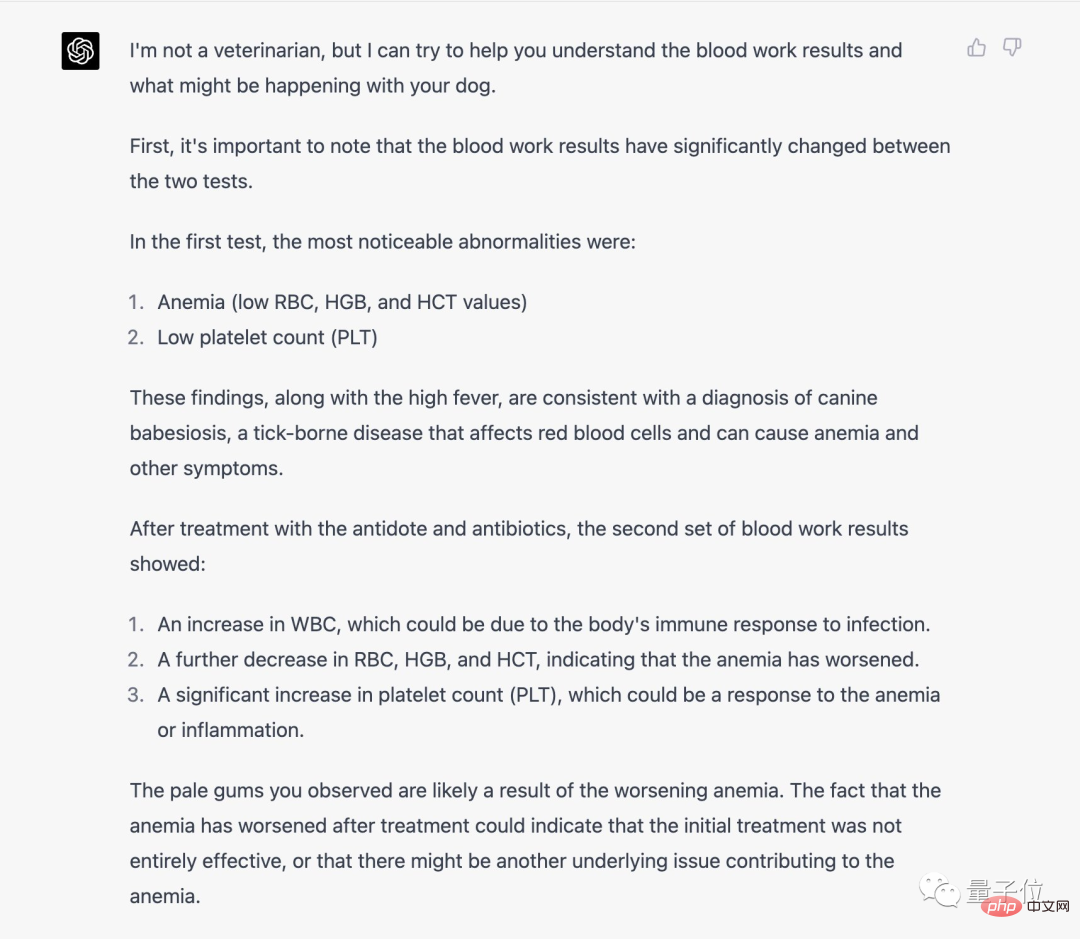
Cooper nodded, thinking that what GPT-4 said was reasonable, and then grabbed the last sentence and immediately asked:
What do you think other potential issues might include?
GPT-4 once again stated that he was not a veterinarian, and then gave several options:
1. Hemolysis: destruction of red blood cells due to various reasons, such as immunity mediated hemolytic anemia (IMHA), toxins, or other infections other than babesiosis.
2. Blood loss: Internal or external bleeding, which can be caused by trauma, surgery, or gastrointestinal problems (such as ulcers or parasites).
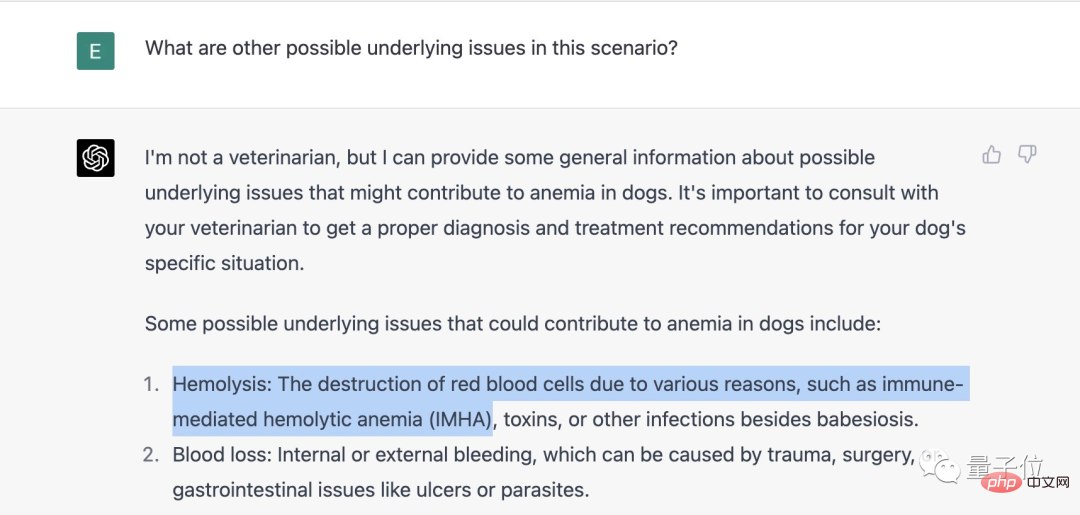
Since Cooper had already used the 4DX test to rule out other co-infections in the hospital and used ultrasound to rule out internal bleeding, he set his sights on IMHA, "This It should be the only result that fits the situation at present."
So, when Cooper took the dog to the second hospital, he directly asked the doctor if it was possible that it was IMHA.
The doctor said it was possible, and after a series of tests, the diagnosis was indeed confirmed!
After the root cause of the disease was found, and after a few days of prescribing the right medicine, the dog was indeed saved!
Cooper was ecstatic.
Only then did he realize: It turns out that these two diseases are very common. The former babesiosis is the number one tick-borne disease, and the latter IMHA is a common complication of the disease, especially On the breed he raised.
Finally, the excited Cooper reviewed the entire treatment process and posted it online.
In his opinion, GPT-4 can be said to have helped a lot in Gouzi’s smooth recovery.
He was filled with emotion:
I don’t know why the first veterinarian didn’t find out the cause, but GPT-4 is really powerful. I can’t imagine the medical diagnosis in 20 years. What the industry is like.
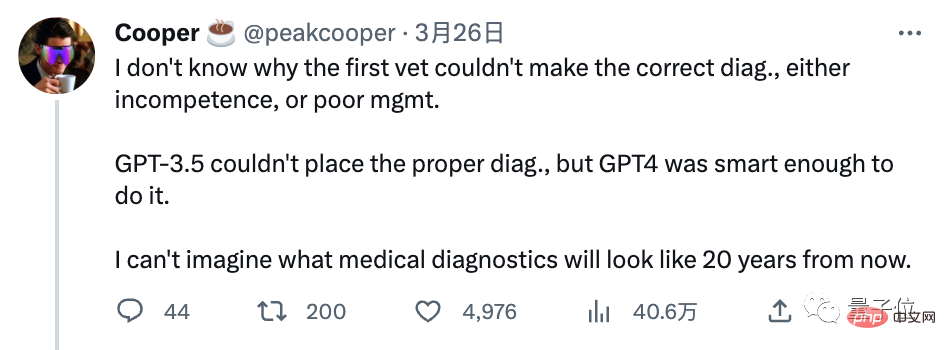
In addition, he also said:
If OpenAI wants to conduct research on this matter, he is willing to provide all information.
Such a "curious anecdote" naturally triggered heated discussions among netizens.
Some people hold a conservative opinion and think that this is just an example, saying that the results can be obtained by searching on Google, but the first doctor did not do so.

(ps. This disease is indeed not a difficult disease. Some netizens said that after reading Cooper’s description, they knew that his dog might have IMHA)

In this regard, someone reminded:
Google will not analyze every indicator in the detection report for you like GPT-4 (this is also Cooper’s most Appreciate GPT-4), and in most cases, if you ask Google about headaches, it may directly throw you "brain tumor" (similar to "water will boil at 100 degrees, and people will die at 100 degrees") ).
In contrast, ChatGPT (GPT-4) is very cautious and will generally first tell you "Headaches can have many different causes. Although brain tumors are possible, they are not the most common cause. Most headaches It's often caused by other factors, such as stress, sinus problems, or migraines."
It then lists headache symptoms specific to brain tumors and tells you to call your doctor immediately if you experience these symptoms.
……
Let’s put aside for the moment the difference between Google and GPT-4 in diagnosing diseases. In fact, it is not the case simply because this matter is an example.
No, a netizen told everyone:
TA recently got a disease that was not diagnosed by two primary care doctors in a row, and was diagnosed by a third, more professional doctor. Specific diseases.
The amazing thing is that when he told GPT-4 about his symptoms, GPT-4 gave the correct result in just one round.

So, is GPT-4 really so powerful in disease diagnosis?
As early as after the release of GPT-4, a MD from Stanford University said:
The potential of generative AI to impact healthcare is vastly underestimated.
But in fact, there are also very pertinent opinions worth savoring. The general idea is this:
The ability of AI does not lie in its cutting-edge knowledge prediction, but in its ability to Being able to think comprehensively about all possibilities of a problem under any influence can easily outperform many human practitioners.

This view coincides with the views of OpenAI co-founder and president Greg Brockman and others——
He A peer-reviewed paper by ChatGPT in Surgical Sciences was recently forwarded, quoting this sentence:
Ultimately, by analyzing things responsibly and thoughtfully, these models have the potential to augment, rather than replace, human level of expertise, becoming a valuable tool in surgical science and clinical care.
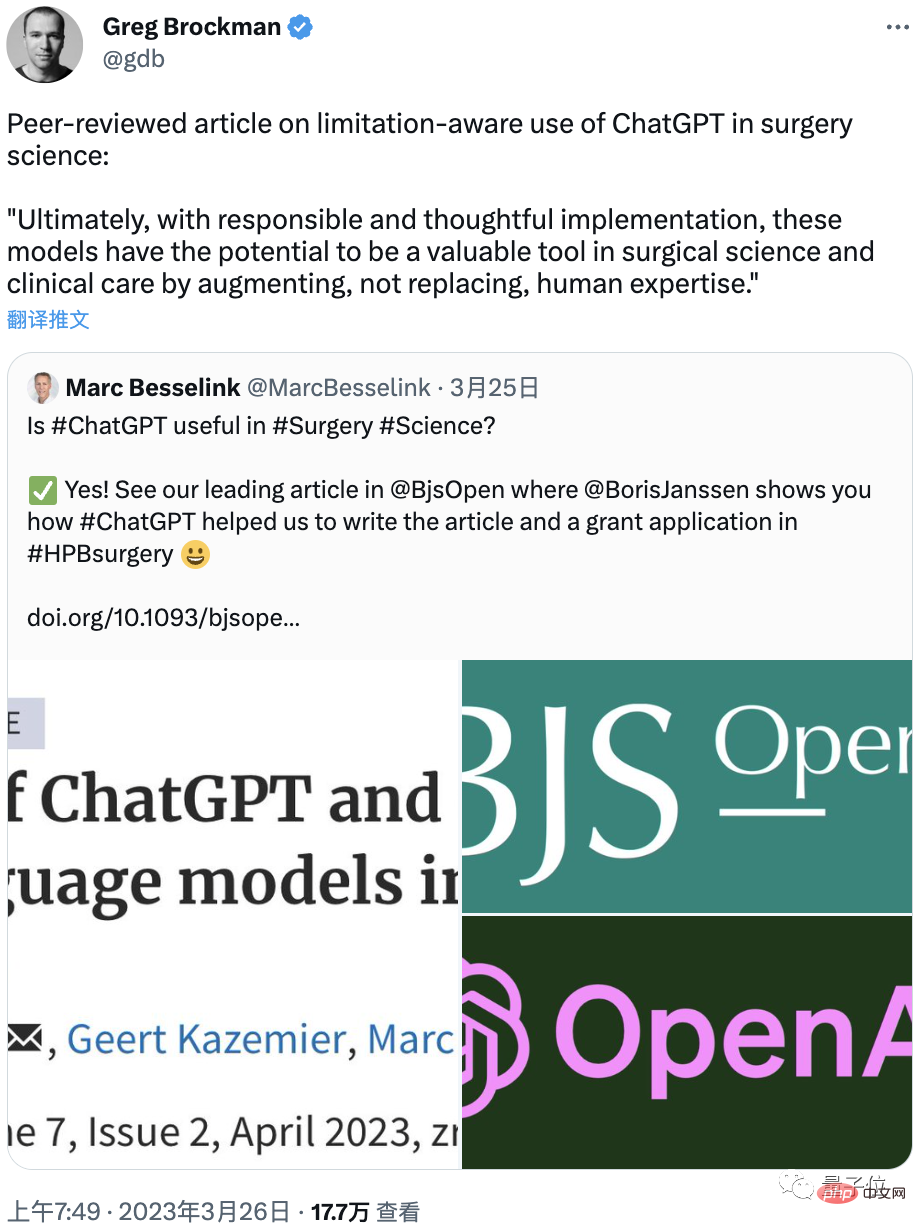
[1]https://twitter.com/gdb/status/1639738170303713293?s=20
[2]https://news.ycombinator.com/item?id=35311667
[3]https://twitter.com/gdb/status/1639776562882174976
The above is the detailed content of GPT-4 saved my dog's life. For more information, please follow other related articles on the PHP Chinese website!
 How to get the input number in java
How to get the input number in java
 How to open nrg file
How to open nrg file
 Bitcoin historical price chart
Bitcoin historical price chart
 How to deduplicate database in mysql
How to deduplicate database in mysql
 There are several output and input functions in C language
There are several output and input functions in C language
 Google earth cannot connect to the server solution
Google earth cannot connect to the server solution
 How to repair sql database
How to repair sql database
 What are the seven principles of PHP code specifications?
What are the seven principles of PHP code specifications?
 How to execute a shell script
How to execute a shell script




